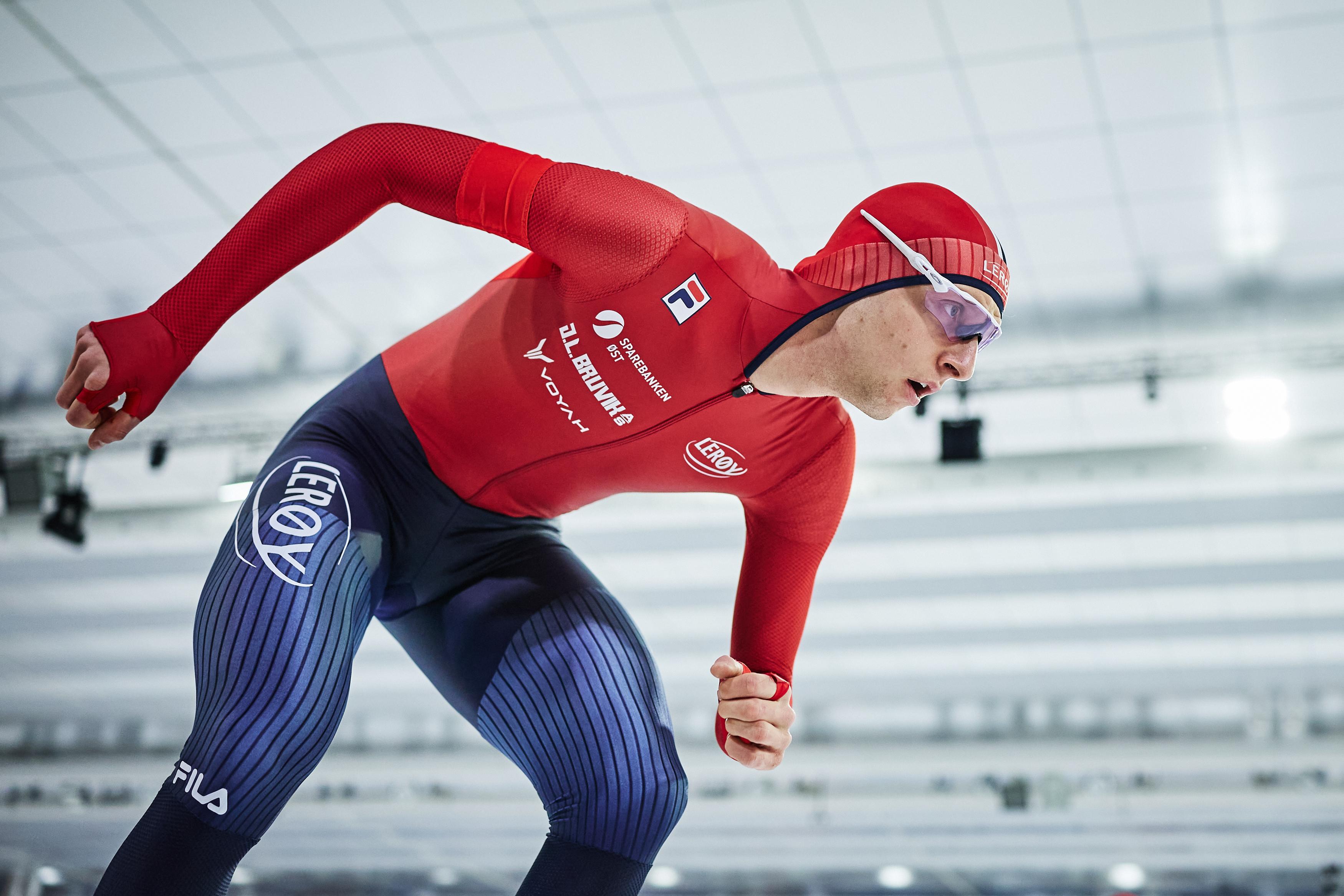SPEED SKATING
History in Heerenveen as Eitrem wins Norway’s first Allround title in 34 years
12 Jan 2025
#SpeedSkating
It had been 34 years in the making. Sander Eitrem finally followed in the footsteps of Johan Olav Koss by winning the first European Allround title for Norway since his legendary predecessor won the title in Sarajevo in 1991. Peder Kongshaug (NOR) joined Eitrem on the podium on the final day of the ISU European Speed Skating Championships in Heerenveen (NED) to seal Norway’s success with silver, keeping Beau Snellink (NED) at bay in a thrilling final 10,000m race.
Friendly fight in the 1500m
After the first day of the Allround tournament, Peder Kongshaug (NOR) and Sander Eitrem (NOR) had established gaps of 3.95s and 3.45s in the 1500m over the rest of the field. It seemed as if the only thing that could prevent a first Norwegian title in 34 years was a clash between the teammates themselves.
“I think if we would have ended up in a situation where it would have gotten dangerous [at a change-up], we would have solved it. We are good friends and neither one of us would want to ruin the race for the other one,” Kongshaug said.
Facing each other in the 1500m, Eitrem and Kongshaug managed to stay out of trouble. As the fastest man in the shorter distances, Kongshaug had to take as big a lead in the 1500m as he could, but long-distance ace Eitrem was able to limit the losses.
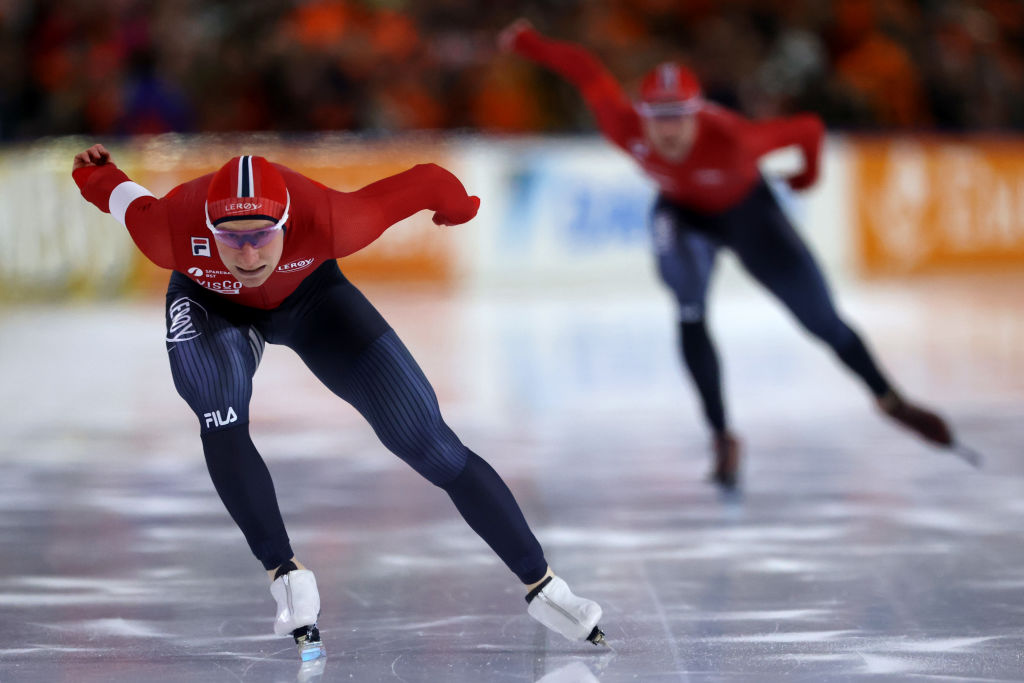
Peder Kongshaug (NOR), left, had to establish a big lead over countryman Sander Eitrem, right, in the 1500m to give himself a chance of the Allround title. © ISU
“I was trying to use him [Eitrem] a bit, but then it ended up with him using me, and Sander chasing me in the last lap, that wasn't the best feeling,” Kongshaug explained.
“But still, it was probably my best race this weekend, so I'm really proud of that.”
Kongshaug won the 1500m in a time of one minute and 44.01s, Eitrem coming second in 1:44.27. Heading into the decisive 10,000m, Kongshaug had a 5.02s gap over Eitrem.
Third-ranked Beau Snellink (NED) dropped to fifth place in the ranking after finishing ninth in the 1500m with 1:47.38.
Kim Min-Seok (HUN) and Daniele Di Stefano (ITA) climbed to third and fourth place to secure a starting slot in the 10,000m.
Davide Ghiotto (ITA) was ranked 12th after the 1500m, but he qualified for the final distance based on his fourth place in Saturday’s 5000m.
Kongshaug concedes as Eitrem puts down the hammer
Ahead of the decisive 10,000m, Eitrem believed he could make up the five-second deficit on Kongshaug, but had been nervous nonetheless.
“I was really nervous to be honest. I wasn't sure if it was going to enough,” he admitted.
Kongshaug’s plan had been to try and match his compatriot as long for as he could, which he managed to do up until they were halfway through the 25-lap race.
“I did everything in the right way, but then I felt that it may be too good to be true, that Sander is just waiting for a moment to attack. And obviously that came, and it was a bit too early for me. After three hard races, I had nothing left,” he said.
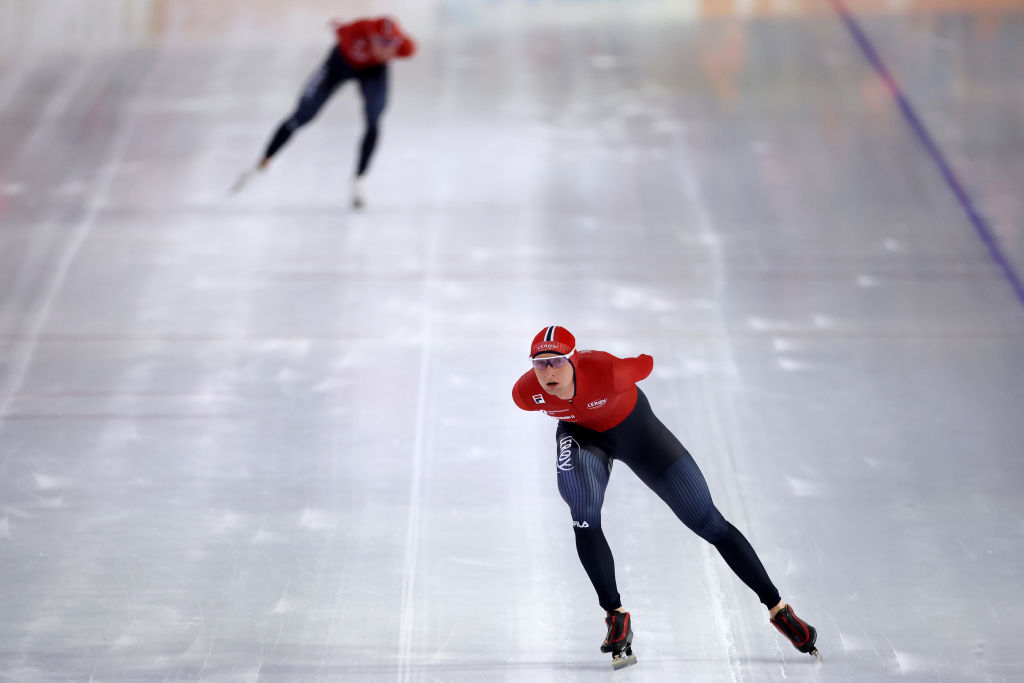
Roles were reversed in the 10,000m as long-distance ace Eitrem, right, eventually moved clear of Kongshaug, left, to claim Norway's first gold in 34 years. © ISU
Eitrem explained his race plan afterwards: “With 12 laps to go, I wanted to attack and I did. But when I saw a low 29 [lap time], I thought, s**t, this was maybe another suicide attempt, as I did yesterday. But luckily enough I won.”
Eitrem was referring to his fast start in the 5000m on Saturday. That race resulted in a Norwegian record, and so did following the same tactic in the 10,000m. Eitrem finished in a time of 12 minutes and 47.90s, breaking the previous national record of 12:53.89 by Håvard Bøkko (NOR) in 2011.
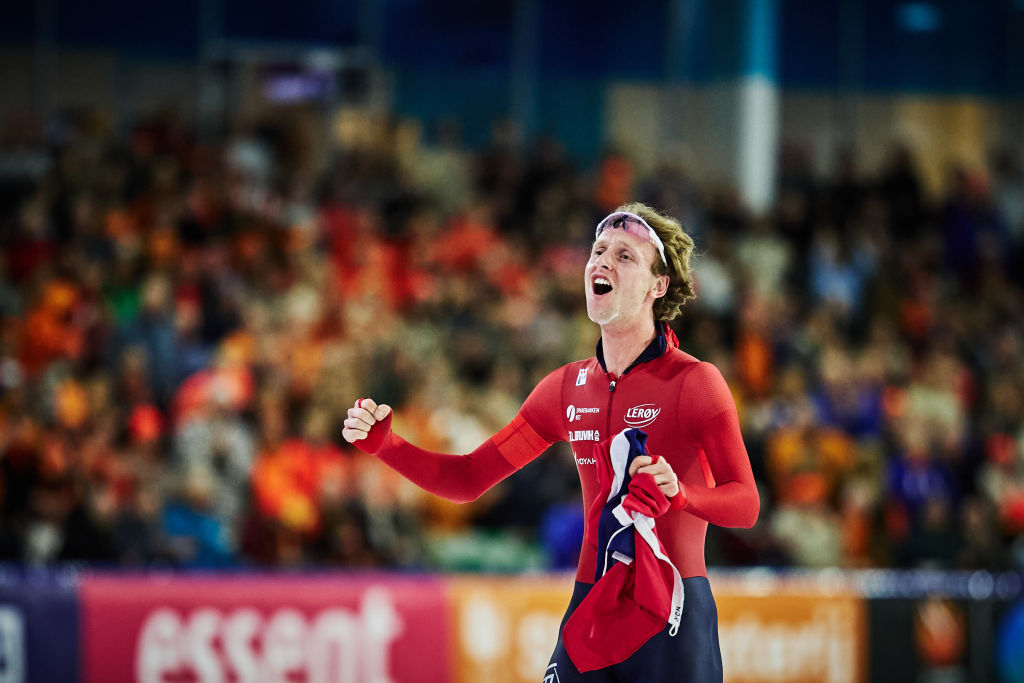
Eitrem set a national record in the 10,000m 24 hours after doing the same in the 5000m on his way to the Allround title. © ISU
Kongshaug finished sixth in the 10,000m, clocking 13:13.94, which was more than enough to keep Beau Snellink (NED) at arm’s length in the overall standings.
The Dutchman finished in 12:54.76 to take overall bronze.
“I wanted to be best of the rest,” Snellink explained. “Those guys [Eitrem and Kongshaug] are a little bit too good for me at the moment.
“For them it’s great [to win the first title for Norway since 1991]. They just skated very good, so it’s well deserved.
“I wanted to be best of the rest and I’m happy to take home a medal.”
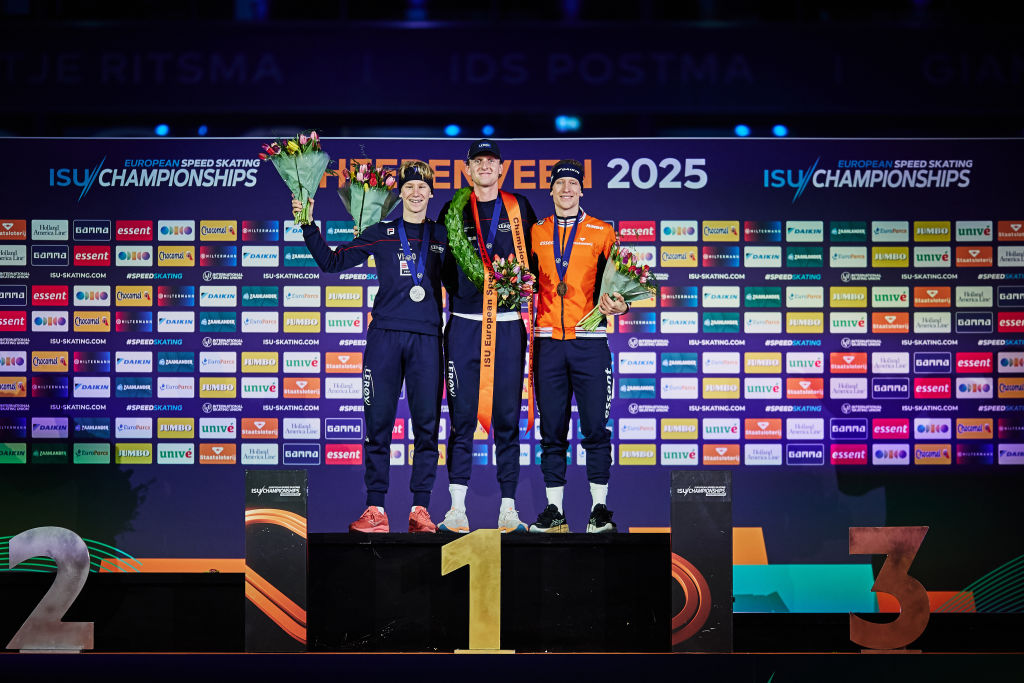
Beau Snellink (NED), right, who joined the Norwegians on the podium, said he was happy to be best of the rest on this historic day. © ISU
Behind Snellink, Davide Ghiotto (ITA) jumped into fourth place by winning the 10,000m in 12:35.96.
Format and schedule
The Sprint Championships are held on Friday and Saturday with a 500m and a 1000m for both genders on each day. The Allround Championships are scheduled on Saturday and Sunday.
The men will skate the 500m and the 5000m on the first day, followed by the 1500m and the 10,000m on the second. The women face the 500m and the 3000m on Saturday, followed by the 1500m and 5000m on Sunday.
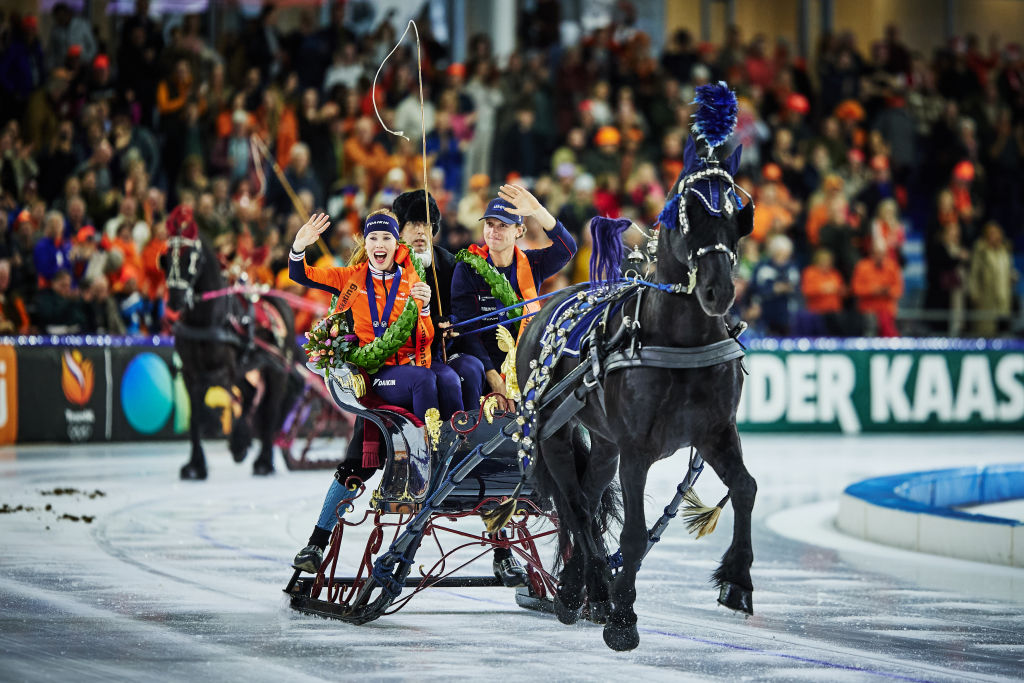
Eitrem and Women's Allround champion Antoinette Rijpma-De Jong (NED) enjoy the traditional celebratory sleigh ride round around the Thialf track. © ISU
In both the Sprint and the Allround tournaments the final ranking is based on the so-called 'samalog' score over four distances. The 'samalog' system converts times into points, with the 500m as the starting point. For a 500m race, the number of seconds counts as the number of points. For the 1000m the number of seconds is divided by two to calculate the number of points; for the 1500m it’s divided by three, for the 3000m by six, for the 5000m by 10 and for the 10,000m by 20.
For all information about the ISU European Speed Skating Championships, please visit the webpage here.




